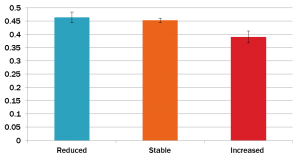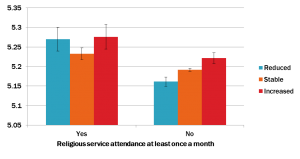Dr Ingrid Storm from The University of Manchester examines economic decline and church attendance in Britain. She found that despite regular churchgoers being able to cope better with economic loss; economic decline does not increase church attendance.
- More than half the population of Britain consider themselves to have no religion.
- Those who have experienced a loss or reduction in income are no more likely to attend church than people who have a stable household income.
- Increases in household income are associated with religious disengagement, but income reduction has no effect on religious attendance.
- However, religious activity may still help some to improve and maintain life satisfaction in the face of economic loss.
Declining Numbers of Churchgoers
More than half the population in Britain now consider themselves to have no religion. Along with many other economically developed countries, this country has experienced a decline in the numbers of people in church on any given Sunday.
An influential sociological theory about why this happens, promoted by Norris and Inglehart (2004) among others, is that people in economically secure situations have less need for the social and psychological support that church attendance and membership can offer.
We know that many people in Britain have financial worries, and some experience dramatic changes to their household finances. But does this make them more religious – and could an economic crisis reverse the trend of religious decline?
Money and Religion
Using data from the British Household Panel Study, where the same people have been followed over a period of 21 years from 1991 to 2012, a newly published article in Journal of Religion in Europe examines a) whether change to a person’s household income can cause a change in their religious behaviour and b) whether religious people are better equipped to deal with the experience of economic loss.
The main finding is that an increase in income is related to less religious service attendance (See Figure 1). But people who have experienced a loss or reduction in income are no more likely to attend church than people who have a stable household income. In other words, income change does not predict increases in religious participation.

Figure 1: Religious service attendance at least monthly by change in household income.
Secondly, people who attend church report considerably higher life satisfaction on average, and it is not affected by income change (See Figure 2). Those who rarely attend religious services had a reduction in life satisfaction when their income was reduced and an increase in life satisfaction when their income was increased. In contrast, the life satisfaction of regular church attendees did not change according to changes in their income.

Figure 2: Life satisfaction (1-7) by monthly religious service attendance and change in household income.
Religious Activity
The main trend in Britain is that of religious stability or decline, and income change does nothing to reverse this trend. Increases in household income are associated with religious disengagement, but income reduction has no effect on religious attendance. However, religious activity may still help some to improve and maintain life satisfaction in the face of economic loss.
Christian affiliation and Church attendance and has been declining in Britain for at least the past sixty years. While there are signs that Christian social engagement has grown after the economic crisis, we do not know if this will have consequences for individual religious affiliation and attendance.
As the UK population becomes less religious, the demand for religion also declines. Simply put, younger generations who have grown up with nonreligious parents and friends, are unlikely to start attending church as adults as a way to cope with financial difficulties.
The full article by Ingrid Storm can be found here. The research has previously been presented at the British Sociological Association’s annual meeting and reported in the Times.
Figure 1: BHPS/ UKHLS 1991-2012. N=107122 obs / 24044 ind. Fixed effects logistic regression model controls for last year’s adjusted household income. Predicted probability assuming that the fixed effect is zero.
Figure 2: BHPS/ UKHLS 1991-2012. N=15111 obs / 23605 ind. Fixed effects model controls for last year’s adjusted household income.
